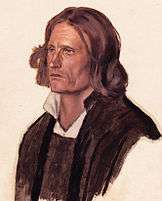Eduard von Gebhardt
| Eduard von Gebhardt | |
|---|---|
 Eduard von Gebhardt, photo | |
| Born |
13 June 1838 Järva-Jaani |
| Died |
3 February 1925 Düsseldorf |
| Nationality | Baltic German |
Franz Karl Eduard von Gebhardt (1838–1925) was a Baltic German historical painter. He was born in Järva-Jaani, Estonia, the son of a Protestant clergyman, and studied first at the Academy of St. Petersburg (1855–58). In 1860 he became the pupil of Wilhelm Sohn at Düsseldorf, where he permanently settled, and became professor at the academy in 1873. One of his students was the German-Brazilian painter Wilhelm Techmeier.
There is a religious tone defining many of his most highly regarded paintings. Their chief characteristic is their deep and powerful yet varied expression of religious feeling. The more important among the many biblical scenes he painted are:
- "Christ on the Cross" (1866, St Mary's Cathedral, Tallinn)
- "The Last Supper" (1870, National Gallery, Berlin)
- "Crucifixion" (1873, Hamburg Kunsthalle)
- "Ascension of Christ" (1881, National Gallery, Berlin)
- "Taking Care of Christ's Body" (1883, Dresden Gallery)
- "Jacob and the Angel" (1893, Dresden Gallery)
- "Christ and the Rich Youth" (1892, Düsseldorf Gallery)
- "Sermon on the Mount" (1893, Düsseldorf Gallery)
- "Healing of the Palsied" (1895, Breslau Museum)
- "Christ upon the Waters" (1902)
Of episodes from the Reformation one is "The Reformer at Work" (1877, Leipzig Museum). In the former Cistercian monastery at Lokkum may be seen six mural paintings: "Scenes from the Life of Christ". Mural paintings of similar subjects may be found at the Friedenskirche, Düsseldorf.
Gebhardt also painted many excellent portraits, and was awarded gold medals at Berlin, Dresden, Munich, Vienna, and Paris; and was elected a member of the academies of Antwerp, Berlin, Brussels, Munich, and Vienna. He died in 1925.
He took prototypes of local peasants which he draw down while visiting Estonia. He was a tutor to famous Estonian painters like Ants Laikmaa, Kristjan and Paul Raud.
Gallery
 Estonian Peasant (1867)
Estonian Peasant (1867) Rich man and poor Lazarus (1865)
Rich man and poor Lazarus (1865) The Raising of Lazarus (1896)
The Raising of Lazarus (1896) Portrait of a Woman (date unknown)
Portrait of a Woman (date unknown)
See also
References
![]() This article incorporates text from a publication now in the public domain: Gilman, D. C.; Thurston, H. T.; Colby, F. M., eds. (1905). "article name needed". New International Encyclopedia (1st ed.). New York: Dodd, Mead.
This article incorporates text from a publication now in the public domain: Gilman, D. C.; Thurston, H. T.; Colby, F. M., eds. (1905). "article name needed". New International Encyclopedia (1st ed.). New York: Dodd, Mead.
| Wikimedia Commons has media related to Eduard von Gebhardt. |